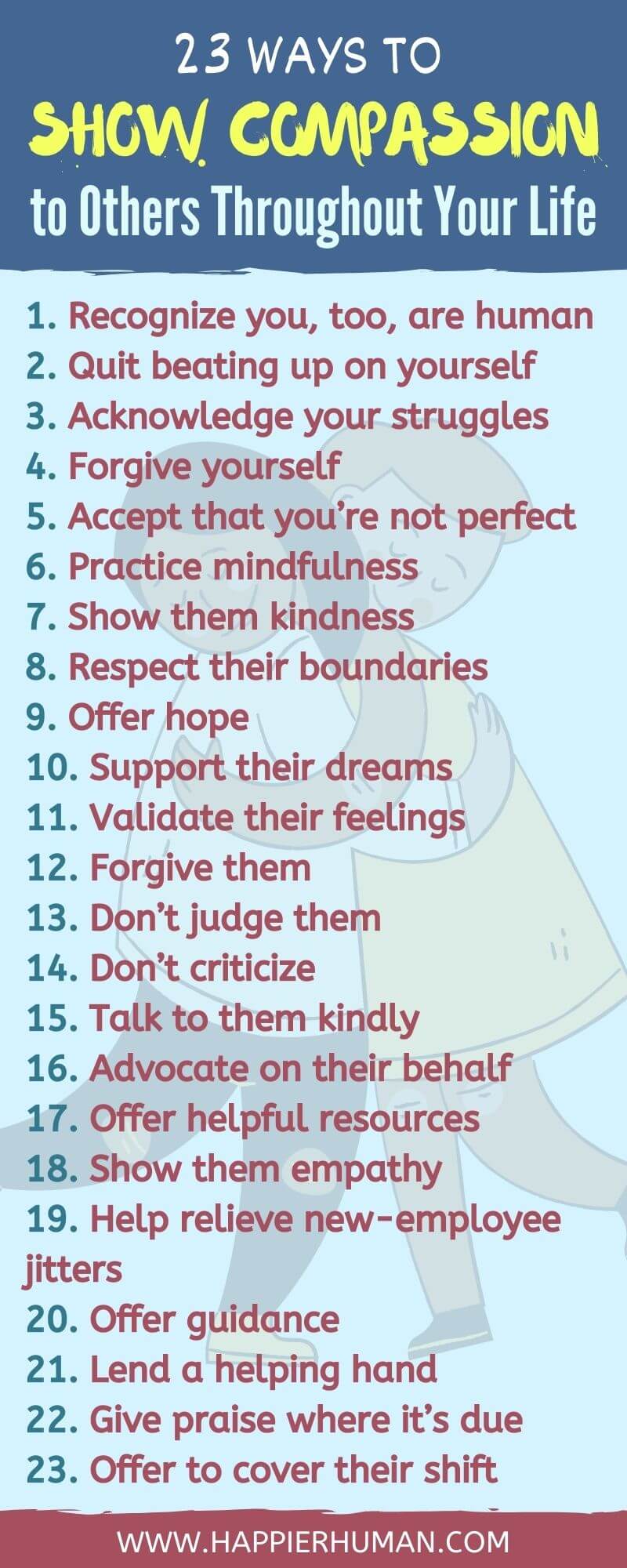There might be affiliate links on this page, which means we get a small commission of anything you buy. As an Amazon Associate we earn from qualifying purchases. Please do your own research before making any online purchase.
The challenges of life affect us all regardless of age, gender, ethnicity, social status, or economic background. Each of us can use assistance or words of encouragement during such trying times.
I frequently encounter family members, people from my social connections – even strangers – who single me out to disclose personal problems or ask for help. I often wondered why. Do I seem like a compassionate person?
Sometimes, all people need is a little compassion… but not everyone knows how to show it.
If you’re one of them… you're in the right place! If you're trying to understand what it means to be compassionate and how to show compassion to yourself and others in practical ways… we’ve got the answer. Just keep reading.
What Is Compassion?
Compassion comes from the Latin word, “compati” and literally means “suffer with.” Compassionate people have the ability to show concern for the misfortunes of others. It could be anyone, adult or child, who's in trouble, sick, hungry, unhoused, or has some other unmet need. When confronted with the struggles, sufferings, or failures of others, they feel strongly motivated, almost compelled, to emotionally take on their “pain” or ease the burden.
The Difference Between Compassion and Empathy
As with empathy, not everyone knows how to show compassion. Compassion is a personality trait that develops through nurture, but you can still learn it as an adult. They both encompass being mindful of someone's needs and willing to help in whatever way you can. Having empathy, or understanding how another person feels, usually makes it easier for you to show compassion.
Why It's Important to be Compassionate
Displaying compassion can help improve the current mental or physical state, feelings, or situation of someone else. Offering a hug or a word of encouragement, in that moment of crisis, can positively change the lives of those who feel vulnerable. They may feel motivated to find solutions they haven't considered because of their current mental state.
Although you cannot save the world, you can play your individual role in making the world a better place. I found that the more I helped improve someone's life, the more motivated I was to help others. Through kind acts, you can inspire others' faith in humanity and they, too, may go on to help others. You're also paying it forward.
How to Show Compassion to Yourself
Self-compassion means showing yourself love and kindness the same way you do for others. Ironically, big-hearted people often unintentionally overlook the need to address their personal sufferings. These self-compassion tips are bound to help you be kinder toward yourself.
1. Recognize you, too, are human
Everyone makes mistakes, some bigger than others. If your spouse or friend made similar mistakes, you may even tell them, “To err is human,” so they can feel better about themselves. Recognize that this same proverb applies to you. It may just so happen that you're not around people who can assure you that we all mess up from time to time. At times like these, you'll need to be your biggest cheerleader and biggest fan.
2. Quit beating up on yourself
You're quick to comfort others when they make mistakes, fail, or feel hurt. Rather than judging them harshly, you soothe and encourage them. Yet, you judge yourself harshly and carry around self-blame, guilt, or shame. Harsh self-criticism or self-bullying can erode your peace of mind and self-esteem. Stop being so hard on yourself. Be your best friend, not your harshest critic.
3. Acknowledge your struggles
It seems easy to just ignore the obstacles or negative emotions you face. Unprocessed emotions will remain there until they are properly dealt with. Catch yourself in the moment and admit that you're having a really difficult time.

Next, think of healthy ways to comfort yourself. Repeating affirmations such as, “I accept myself for who I am, regardless of my shortcomings,” helps reinforce seeing yourself in a positive light.
4. Forgive yourself
Our relationship with ourselves sets the pace for relationships with others. Self-forgiveness means to quit punishing yourself for missteps. It allows you to let go, something that helps bring healing and peace of mind. People may be more willing to “bury the hatchet” with you because you don't hold grudges against yourself.
5. Accept that you're not perfect
You cannot get exactly what you want 100% of the time. Denial of this reality is a source of frustration, self-criticism, stress, and persistent personal dissatisfaction. I often say to myself, “I love how perfectly imperfect I am,” and even laugh at myself when I mess up. Taking this perspective enables you to be kinder and more gentle with yourself whenever you miss the mark.
6. Practice mindfulness
The tendency to ruminate and worry about the present, past, and future is linked to anxiety. Mindfulness is a form of meditation that challenges you to live in the present moment. One of the principles is accepting things for what they are, which can lessen your tendency to self-judge or put negative labels on your thoughts, emotions, and feelings.
How to Show Compassion to Others
Thinking about the well-being of others is closely linked to selflessness. However, you don't need to show it only when someone is hurt or experiencing setbacks. You can be proactive by anticipating the person's needs and meeting them before they ask. You can take preventative action to protect them from harm. This is called distal compassion.
7. Show them kindness
“Kindness makes the world go round.” (Mark Twain) Perform random acts of kindness whenever time permits. Offer to care for your kids while your wife takes a nap or help a friend move into their new home. Extend your generosity to your neighbors and co-workers. It can be something as simple as agreeing to do your neighbor's grocery shopping if they are ill or immobile.
8. Respect their boundaries
Make it your duty to respect people's wishes. By this, you're conveying that you're not a boundary-crasher. If your co-worker says they prefer not to hug or decline your help, respectfully accept and don't push it. That's perhaps the most compassionate thing you can do in the circumstances. You did nothing wrong. Pride and not feeling deserving of kindness can cause some individuals to refuse help.
9. Offer hope
Telling someone something like, “It's going to get better,” is one way to inspire hope. Assuring them that you're there for them is another compassionate thing to say. I've recently been reassuring a friend that she'll overcome the initial challenges of being a single mom. Her husband died suddenly, leaving her with three young children. Words of hope can literally be a lifesaver for those on the brink of giving up.
10. Support their dreams
Chances are you've experienced telling someone your goals and dreams for success, only to be told, “You're gonna fail!” It's a deeply painful thing to hear and can shatter your self-esteem. Listen to your children or spouse when they share their life goals. Let them know they have what it takes to achieve them. Tell them you'll support them all the way.
11. Validate their feelings
Validating someone else's feelings shows them what they're saying or how they're feeling matters. Some people, like narcissists, are experts at minimizing how you feel. They'll blame you for your emotions over their wrongdoings and tell you to “Get over it.” When you listen and accept that your parent or friend has a right to think or feel a certain way, you make them feel heard, understood, and valued as an individual.
12. Forgive them
As the saying goes, “Revenge is a dish best served cold.” Counter that suggestion by believing forgiveness is the virtue that will heal your wound. Revenge will just make you feel more miserable and not proud of yourself. I know you may want to hurt them back, so they can feel how you feel. Instead, be quick to forgive and show mercy the same way you want others to do for you. Choosing forgiveness is a healthy way to cope and let go of anger or resentment towards the wrongdoer.
How to Show Compassion to Strangers and the Poor
People who are authentically compassionate treat strangers just as well as they treat loved ones. Here are examples of ways to practice humanity toward strangers or the poor.
13. Don't judge them
“He must have been a terrible man when he was young, no wonder he's homeless.” That's something someone who lacks compassion will likely say.

Anyone can end up homeless. Whether it's a homeless person or someone faced with other types of adversities, offer help or a kind word if you can. But don't judge.
14. Don't criticize
People are naturally wired to avoid negative criticism. You may understand how it feels if someone criticized you before. Criticisms include identifying, judging, and labeling someone's flaws. Calling someone “lazy” or saying, “You're terrible at this job!” are examples of negative criticisms. These labels make people feel devalued, inadequate, or unworthy.
15. Talk to them kindly
Because it's a stranger does not mean it's okay to talk down to them. Be mindful of your tone, choice of words, and facial expressions. Communicate in a respectful way, even when you're providing help. Give them your full attention, don't interrupt, and respond using encouraging or motivational words.
16. Advocate on their behalf
Speak up or stand up for a child who's being bullied or an adult who's being taken advantage of. Stepping in, instead of looking on or recording a video of the scene, can prevent a crime from happening. A person might be overlooked for a social benefit because they're unable to speak English. If you're bilingual, step in and offer to interpret on their behalf.
17. Offer helpful resources
There are people in vulnerable situations who don't know how to get help. A woman in an abusive relationship may want to leave her partner but feels trapped or afraid. Offer resources such as the number of the National Domestic Violence Hotline or a shelter for battered women. You could save her life by simply providing a telephone number.
18. Show them empathy
Provide encouraging words to someone who is sick or feeling burdened. Let a single mom who's having a hard time caring for her children know that you can imagine what she's going through. It's okay to say “I feel your pain” or “I understand” what you're going through if you're a single mom yourself who knows the struggle.
How to Show Compassion at Work
Pressure from the workplace is a common source of stress for employees and bosses alike. Your compassion can contribute to making the workplace a welcoming environment. Below are ways to make an employee or co-worker's day better.
19. Help relieve new-employee jitters
The first day on the job comes with nervousness, uncertainty, and anxiousness about being among total strangers. Introduce yourself to the new employee and assure them they've joined a supportive team. Give them a walk-through to help them feel at home. Using humor, you can even let them know that the boss is cool and approachable and not as scary as they appear. You'll make your co-worker feel seen, included, and relieved.
20. Offer guidance
New employees, especially, tend to experience challenges performing tasks that involve unfamiliar procedures. As a seasoned employee, you can offer to explain a simpler way to complete the project just as effectively. This will save time and increase your co-worker's productivity. They may even get a favorable performance report from your boss.
21. Lend a helping hand
You understand the pressure related to meeting a tight deadline all too well. Missing it can have consequences, perhaps a trip to your boss's office to explain.

Help relieve the stress your co-worker is feeling by electing to help them complete an assignment on time. Helping will confirm that you were authentic when you assured them earlier on they've joined a supportive work team.
22. Give praise where it's due
Be the type of boss who recognizes the strengths and positive attributes of your employees and celebrates their achievements. Applauding them will make them feel like an asset to the company. Recognizing the contributions of your employees often serves as motivation and can increase productivity. Your employees may feel happier around a boss who knows how to show compassion.
23. Offer to cover their shift
There are times when employees need to call out to deal with personal or family emergencies, such as a sick child. Another way to demonstrate the “I understand you,” “I feel your pain,” and “I want to help you,” principles of compassion is by offering to pick up the slack. I'm sure they'll be grateful and relieved knowing the rest of the team won't feel the workload strain due to their absence.
Final Thoughts on How to Show Compassion
We should all strive to be authentically kind, considerate, respectful, and forgiving… whether it's toward someone in your social circle, a complete stranger, or a less fortunate individual.
You should show compassion to children and adults equally. Offer help when they're going through hard times or do something that can protect them from mistakes or harm.
Once you've learned the skillful art of compassion, you'll see how even a little can make a huge impact on the life of another. Read this article on 11 Ways to Practice Humility Throughout Your Life for more ways to be the best version of yourself.
Finally, if you want to increase your happiness and life satisfaction, then watch this free video that details the 7-minute habit for planning your day to focus on what's important.


